David Wemyss, Lord Elcho facts for kids
Quick facts for kids
David Wemyss, Lord Elcho, de jure Earl of Wemyss
|
|
|---|---|
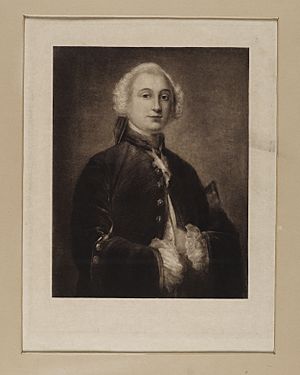
David Wemyss, Lord Elcho ca 1741
|
|
| Born | 21 August 1721 Wemyss Castle, Fife |
| Died | 29 April 1787 Paris |
| Buried | |
| Allegiance | |
| Service/ |
Army |
| Years of service | 1745-1763 |
| Rank | Colonel |
| Unit | Royal-Ecossais |
| Battles/wars | Jacobite rising of 1745 Battle of Prestonpans Falkirk Muir Culloden Seven Years' War |
| Awards | Royal Company of Archers Order of Military Merit (France) 1770 |
| Relations | Francis Charteris (1675-1732) 5th Earl of Wemyss (1699-1756) Sir James Steuart 1708-1780 |
David Wemyss, Lord Elcho (born August 21, 1721 – died April 29, 1787) was a Scottish nobleman. He supported the Jacobite cause and took part in the 1745 Rising. Because of this, he lost his titles and lands.
He was one of the few Jacobites not allowed to return home after the Rising. He spent the rest of his life living in France and Switzerland. His wife, Sofia, passed away in 1777. Lord Elcho had no children who could inherit his titles. When he died in Paris in 1787, his property went to his younger brother.
His writings about the 1745 Rising are very important. They are called A short account of the affairs of Scotland in the years 1744, 1745, 1746. This book is a key source for understanding that time.
Contents
David Wemyss: A Jacobite Story
Early Life and Family
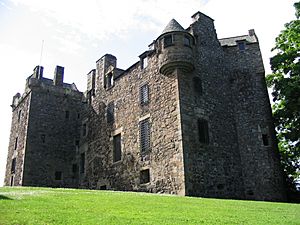
David Wemyss, Lord Elcho, was born on August 21, 1721. His birthplace was Wemyss Castle in Fife, Scotland. He was the oldest son of James Wemyss, the 5th Earl of Wemyss. His mother was Janet Charteris.
His title, Lord Elcho, came from Elcho Castle. This castle was left empty in the 1730s. However, it was later fixed up in the 1800s. It is one of the first Scottish buildings saved just for its history.
David had two younger brothers, Francis and James. His sister, Frances, married Sir James Steuart. Sir James was also exiled for his role in the 1745 Rising. He was later allowed to return home.
In 1776, Lord Elcho married Sofia. She was the daughter of a German count. Sofia passed away a year later. Lord Elcho had no children who could inherit his noble title. His property went to his younger brother. He died in Paris in 1787 and was buried there.
Education and Early Travels
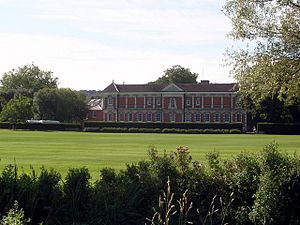
Like many people who supported the Jacobites, David Wemyss had a certain background. His family was against the Union of Scotland and England. They also had ties to Freemasonry. However, his family was not known for being very active in earlier rebellions.
After his parents separated, David went to Winchester College in England. This was a long journey from his home in Fife. He later wrote that he rarely saw his father during these years. One of his classmates was James Hamilton, who later became the 6th Duke of Hamilton.
David left Winchester in 1738. He then studied at a French military academy in Angers. After that, he went on a trip called the Grand Tour. This was a popular journey for young noblemen in the 1700s. He visited Rome in 1740. In Rome, he met James Stuart and his sons. James Stuart was the exiled king, also known as the "Old Pretender."
Joining the Jacobite Cause
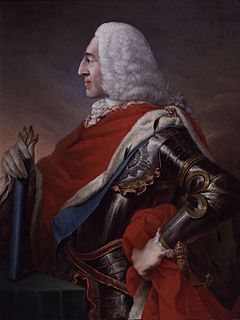
In the late 1730s, things changed. France wanted to reduce Britain's power. Some French leaders started to think about helping the Stuart family return to the throne. David Wemyss arrived in Rome when these ideas were gaining attention.
In 1739, a trade dispute led to the War of Jenkins' Ear. This then grew into a bigger war in Europe, the War of the Austrian Succession. France lost a battle in 1743. This made the French king, Louis XV, want to distract Britain. He planned an invasion of England in 1744 to bring back the Stuarts.
James Stuart gave David Wemyss a military rank as a Colonel. But the French invasion plan failed due to bad storms. David returned to Edinburgh in 1744. There, he joined a pro-Jacobite group called the Buck Club. This club included his old classmate James Hamilton.
The 1745 Rising
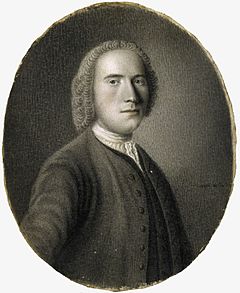
In July 1745, Prince Charles landed in Scotland. He was James Stuart's son, also known as "Bonnie Prince Charlie." David Wemyss first wanted Charles to go back to France. But Charles convinced others to support him. He started the rebellion in August.
Charles's small army marched towards Edinburgh. They reached Perth in September. Lord George Murray joined them there. David Wemyss met them outside Edinburgh. He brought £1,500 in cash, which Charles gladly accepted.
David Wemyss became an aide to Charles. He also joined the Council of War. This group of leaders included Highland chiefs. David raised a troop of "Lifeguards." These were the best cavalry in the Jacobite Army. They served as Charles's personal guards.
However, there were disagreements among the Jacobite leaders. Charles did not fully trust Lord George Murray. Later, the decision to retreat from Derby caused a big split. Many Scottish supporters, including David, were upset.
At the Battle of Culloden in April 1746, the Lifeguards helped Charles escape. Charles then sent them away. On May 3, David Wemyss and other Jacobites were picked up by French ships. These ships fought their way past British navy vessels. Charles was left behind in Scotland.
Life in Exile
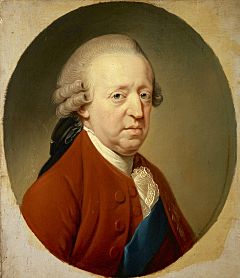
Charles escaped Scotland in October 1746. But the Treaty of Aix-la-Chapelle in 1748 ended French support for the Stuarts. The Scottish Jacobites also no longer trusted Charles.
David Wemyss lost his titles and lands. He was not allowed to return home. He wrote to a Scottish judge, asking to come back. He promised to be a loyal subject. But his pleas were not successful.
The former Jacobite leaders argued about why the Rising failed. Charles refused to pay David back for the money he gave in 1745. David joined the French army. He became a Colonel in the Royal-Ecossais regiment. This regiment was stationed in Gravelines and Dunkirk during the Seven Years' War. In 1770, the French king gave him the Order of Military Merit.
David Wemyss spent his time between France and Switzerland. He bought property in Switzerland and became a Swiss citizen. In 1776, he married Sofia von Üxküll-Gyllenband. She passed away a year later in Switzerland. David Wemyss died in Paris in 1787. His burial place was later destroyed during the French Revolution.
He left behind two important writings. One was a journal in French about his life. The other was "A Short Account of the Affairs of Scotland, 1745-1746." This book was published in 1907 and is a valuable historical record.
Sources
| Peerage of Scotland | ||
|---|---|---|
| Preceded by James Wemyss |
soi disant 6th Earl of Wemyss 1756 – 1787 |
Succeeded by soi disant Francis (Wemyss) Charteris |
 | Charles R. Drew |
 | Benjamin Banneker |
 | Jane C. Wright |
 | Roger Arliner Young |

